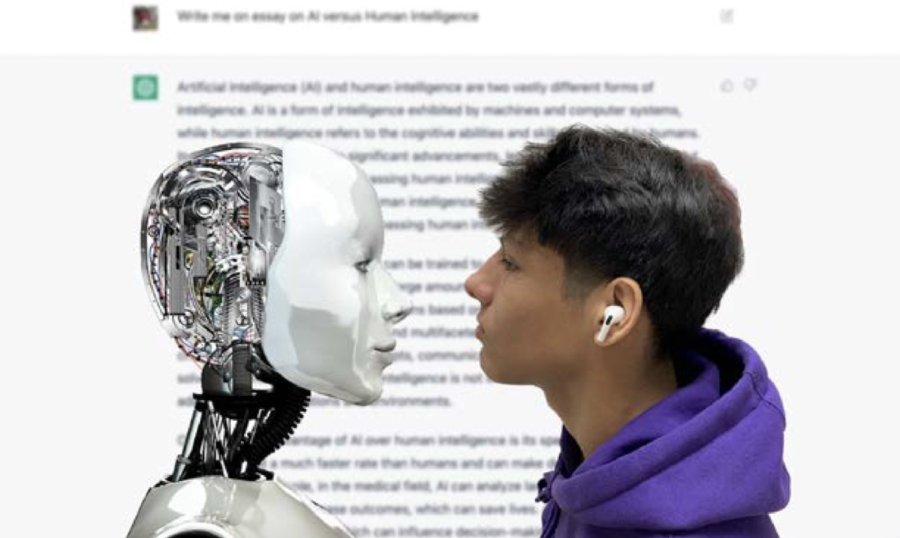ChatGPT: Erase or Embrace?
Senior Marcelo Pozo is one of many students who face the internal struggle of academic integrity while deciding whether or not to use ChatGBT to complete assignments.
Senior Marcelo Pozo stays up all night researching, developing, and writing an IB paper worth a significant portion of his semester grade.
His introduction reads, “Herbert Hoover’s response to the Great Depression has been criticized for being inadequate, slow, and ineffective. He believed in the principles of rugged individualism and limited government intervention, and his policies reflected this.”
You probably think he wrote that sentence. It’s an accurate description of Hoover’s presidency that would pass any originality check you could possibly run and it was submitted in his paper.
Nope. Not even a little bit.
He typed six words into ChatGPT and within seconds, a five-paragraph response reflective of Hoover’s presidential tenure was spewn back out at him.
ChatGPT was released to the public in late November, and it has since grown in both popularity and controversy. The program is easily accessible and infused with artificial intelligence (AI) and it appears to be a revolutionary program in the internet space.
In January alone, the program had over 100 million active users. Servers often struggle to maintain consistency due to the vast influx of activity.
Within that 100 million users lies a large proportion of the student population across the world. By no means was this an unpredictable occurrence. The program offers students the possibility of inputting a single sentence, question, or prompt, and receiving a comprehensive and accurate paragraph or essay response.
As students within AHS try to balance the daunting task of a high-level homework course load and preparation for summative assessments that are more important now than ever, it is easy to fall into the trap of using ChatGPT to finish assignments.
“I haven’t used ChatGPT at all for any assignments,” senior Olivia Cruz said. “I know there are ways of using it without directly cheating and it can be a beneficial learning resource, I just haven’t explored that yet.”
The program does provide various facts or statistics that can be used to better understand academic concepts and material.
Despite this, in precautionary measures to avoid students’ use of ChatGPT and various other AI programs, AHS has taken strides to limit students’ access to the site.
The ChatGPT IP address has been restricted on all AHS networks and devices, meaning students cannot access the program in school or on their school-issued devices. Although, the approach to the program’s use in school going forward has not been identified.
“In the coming months and over the summer, AHS instructional council, alongside every other FCPS school, will discuss the approach to ChatGPT and the impact that it has had,” Principal Shawn DeRose said.
AHS is an International Baccalaureate (IB) school. IB is a worldwide program with influences in all spheres of education, making their approach to this situation valuable.
IB recently announced that their students will be allowed to use ChatGPT on essays as a resource, as long as they do not attempt to pass off the program’s responses as their own words. Students are allowed to cite ChatGPT as an encyclopedia-like resource.
The world and education landscape is changing. Whether the change is for the better or worse remains to be seen, but adaptation is necessary as technology continues to develop and innovate.
Just recently, Google announced their launching of “Bard.” Google announced Bard as an “experimental conversational AI,” and the expectation is that it will rival ChatGPT. As more networks and softwares launch AI tools, the reality must set in that it will play a role in modern lives.
Like anything else, ChatGPT has its benefits and detriments to learning. It can be used to deepen students’ understanding of concepts at a rapid pace and at the same time be taken advantage of and abused by students to where they can rely on the program to complete entire projects or writing assignments for them. They can simply copy and paste from the program into their assignments without a shred of effort or academic integrity.
Evolution is inevitable, and how AHS responds to it will shape the curriculum and learning practice for years to come.

Senior David Sewall is the Editor in Chief of The A-Blast. This is his third year on staff, he previously worked as the Sports Editor and as a Staff Writer....













